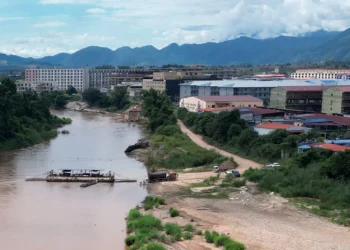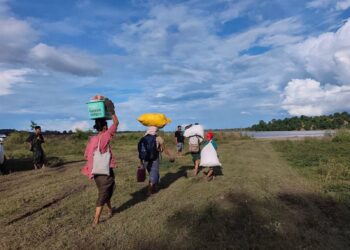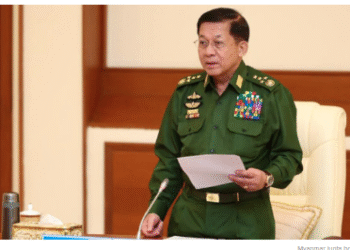A year ago today, Myanmar awoke to the news that its military leaders had resumed use of the death penalty, following a moratorium of over three decades. Among the four men executed was Phyo Zeya Thaw, a former member of parliament and alumnus of EUVP, the European Union’s programme for young leaders and opinion formers outside the EU. The veteran democracy activist Kyaw Min Yu, widely known as Ko Jimmy, was also hanged.
The executions, following sham trials, were further evidence of the Myanmar military’s contempt for the life and dignity of the very people they are supposed to protect.
In the 12 months since, this contempt has reached new lows, with relentless airstrikes destroying hospitals, schools and places of worship. One such junta attack in early April killed almost 170 civilians. In postcoup Myanmar, children are tortured and subjected to mock executions, the elderly are burned to death, and rape is used as a tactic of war.
As army tanks rolled into the centre of Myanmar’s capital Naypyidaw on 1 February 2021, the junta swept away a decade of tentative democracy, unprecedented economic development and fragile progress towards greater press freedom. In the period since, at least 3,800 people have died at the hands of the military, the junta has scorched 70,000 civilian properties, and almost 1.6 million people have fled their homes. This last figure is in addition to the more than one million Rohingya refugees who remain in Bangladesh following their expulsion by Myanmar’s military.
The price of food rose by 177 percent last year alone, and over a quarter of the population does not have enough to eat. The voices of civil society and independent media have been strangled and, after China, Myanmar now has the second highest number of journalists behind bars. The number of political prisoners in detention is nearing 20,000, including deposed president Win Myint and state counsellor Aung San Suu Kyi.
Nevertheless, the people of Myanmar have resisted. The shadow National Unity Government (NUG), recognised by the European Parliament as the country’s legitimate representative, is keeping the flame of democracy alive both from inside Myanmar and from afar. A network of ethnic militias and People’s Defence Forces have taken up arms to oppose the junta, which has lost control of up to half of the country, forcing it to postpone its reprehensible plans to hold sham elections. Meanwhile, Myanmar’s population has valiantly opposed the coup from the outset with strikes and a civil disobedience movement.
Indeed, for perhaps the first time, the people of Myanmar are united across ethnic and religious lines to end the tyranny of Min Aung Hlaing and his henchmen. Yet, their efforts may be in vain if the international response to the coup remains one of timidity rather than tenacity.
While key supporters of democracy, including the European Union and the United States, have imposed several rounds of sanctions since the coup, there has been a failure to stop or even slow the flow of weapons to the military. In fact, a UN report shows that the junta has imported arms and materials worth at least $1bn since seizing power. And it is not just entities in China, Russia and India that are profiting from the misery of Myanmar’s people, networks and companies in other Southeast Asian countries are also facilitating the junta’s atrocities.
While the Biden administration last month imposed sanctions on two of Myanmar’s largest regime-controlled banks, it is high time for it to follow the EU in targeting the state-owned oil and gas company, which continues to bankroll the junta’s war crimes. In turn, others in the international community should join the United States in imposing sanctions on Myanmar’s financial institutions. Also urgently needed are measures to address lax enforcement and the circumvention of existing sanctions.
While there have been various shows of solidarity with Myanmar’s shadow civilian government, they have not been accompanied by concrete actions to support what is the most inclusive attempt at governance in Myanmar’s history. The NUG has committed to establishing a new constitution and a genuine federal democracy, which would be a major step towards fulfilling the aspirations for autonomy of the country’s ethnic minorities, including the Rohingya.
Leading NUG ministers have been welcomed in Brussels, Washington and other capitals, and the NUG continues to occupy Myanmar’s seat at the United Nations. Yet, the calls of various parliaments for formal recognition of the pro-democracy government remain unanswered.
It is time for all in the international community to ensure the NUG, as Myanmar’s legitimate government, is empowered to bring an end to the crisis. This should include support for local government structures, capacity building on governance and federalism, nonlethal assistance for the armed resistance, and the facilitation of dialogue between the NUG and ethnic groups, which too are playing a fundamental role in resisting the junta.
As a future, peaceful Myanmar will rely on the full and equal participation of women and of all ethnic groups, the NUG in turn must allow more ethnic and women voices to be heard, and end all practices that discriminate against the Rohingya.
The NUG, Myanmar’s democratic lawmakers, ethnic groups and civil society must also be at the table in all efforts by the international community to end the current violence. On that note, it must be acknowledged that the international response so far simply has not borne fruit, not least because of the junta’s contempt for ASEAN’s five-point consensus, signed in April 2021.
Last November, ASEAN leaders called for a plan with “measurable indicators” and a “specific timeline” for implementing the consensus. Eight months later, this plan has yet to be published. Ahead of the bloc’s next summit in early September, the current ASEAN chair Indonesia should consider measures to ensure real accountability for the junta’s disregard for ASEAN’s agreed consensus. The Indonesian chairmanship can count on the full support of the European Union in its efforts to diminish the Myanmar military’s capacity to kill its own people.
Indonesia’s chairmanship has already conducted over 100 meetings with the aim of paving the way for an inclusive dialogue with all parties in the conflict. This work must be allowed to continue, and I reiterate the call of the International Parliamentary Inquiry on Myanmar, which I chaired, for a permanent ASEAN special envoy to Myanmar. Indonesia’s establishment of a dedicated office of the special envoy is a welcome step in that regard.
Less welcome was the outgoing Thai government’s recent unilateral engagement on Myanmar, which undermined ASEAN unity and the efforts of the Indonesian chairmanship.
Of course, as the international community struggles to get a handle on the crisis, the humanitarian situation in Myanmar goes from bad to worse, with the junta preventing aid deliveries, including to areas devastated by a cyclone in May. International aid must be increased significantly and delivered directly to Myanmar’s civil society and ethnic organisations. Support in the form of cash transfers should also be increased as material assistance is more likely to be confiscated by the junta.
Meanwhile, the military must be held accountable for its gross human rights violations, and its disregard for international law, including the December 2022 UN Security Council resolution. To ensure accountability by all means possible, now is the time to provide support to those who are documenting war crimes inside Myanmar.
With authoritarianism on the rise in much of our world, the struggle of the Myanmar people is the struggle of all who cherish democracy and justice everywhere. Let’s turn our words of support into resolute actions. Let’s show the same resolve as all those fighting for democracy in Myanmar. And let’s realise the dream of Phyo Zeya Thaw and Ko Jimmy, the dream of a peaceful and more just Myanmar.
Source-Al Jazeera






